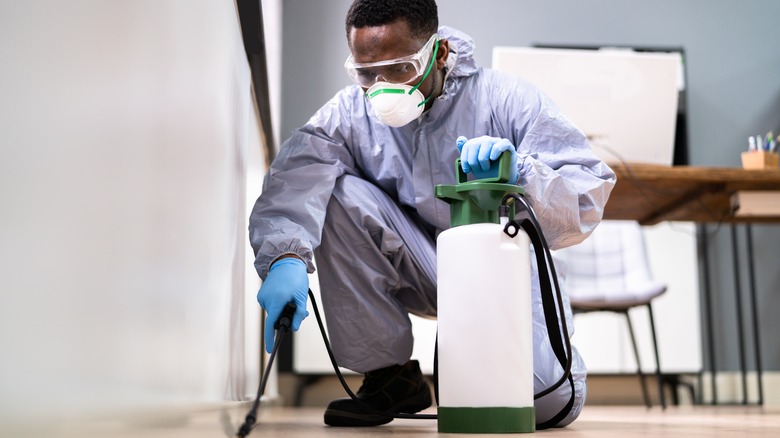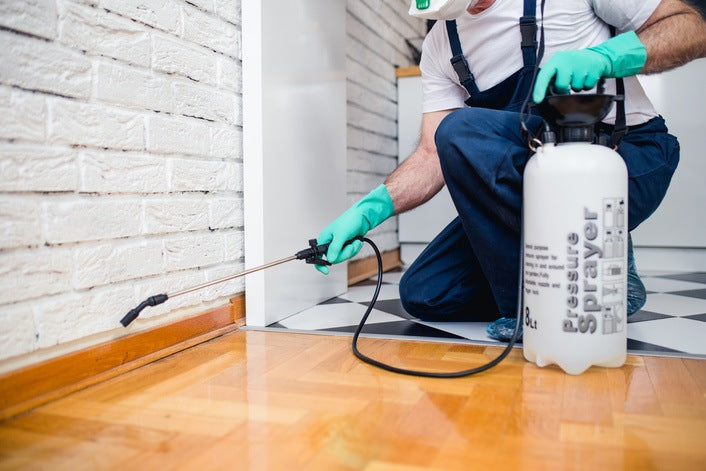Professional Mosquito Control Services for a Relaxed Outdoor Living Space
Discover the Value of Bug Control in Maintaining a Healthy And Balanced Setting and Treatment Techniques

The Duty of Bugs in Communities
Pests, usually watched entirely as hassles, play a diverse function in ecosystems that is essential for keeping environmental equilibrium. They add significantly to different environmental processes, including pollination, vitamins and mineral biking, and parasite control. Lots of insect types, such as butterflies and bees, are vital pollinators for a broad range of plants, which in turn sustains biodiversity and food production.
Furthermore, bugs act as prey for various predators, creating a crucial web link in food internet. This interdependence makes certain the survival of different varieties and assists control populaces within ecosystems (Termite treatment Port Charlotte). Moreover, decomposer insects, such as particular beetles and fungis, are important in damaging down natural issue, therefore enriching dirt and promoting vitamins and mineral recycling.
Conversely, while bugs can be valuable, their overpopulation or invasion into non-native environments may interfere with these environmental functions. This complexity highlights the significance of recognizing parasite dynamics, as effective bug management methods should take into consideration both their environmental duties and prospective effect on human tasks. Balancing pest existence while lessening damage is crucial for preserving the integrity of environments and ensuring agricultural performance.
Wellness Risks Connected With Pests
The visibility of bugs in different settings prolongs beyond their ecological functions, as they likewise present significant health risks to pets and people. Lots of insects, including parasites, rats, and bugs, are providers of illness that can have major health effects. As an example, rodents are understood to transmit hantavirus and leptospirosis, both of which can result in severe respiratory system and kidney issues, specifically.
Insects such as insects and ticks are notorious for spreading vector-borne diseases like malaria, dengue high temperature, and Lyme illness. These health problems can cause high morbidity and death prices, especially in susceptible populations. Furthermore, pests like bedbugs and cockroaches can exacerbate allergic reactions and asthma, adding to respiratory troubles in individuals, specifically those with pre-existing problems.
Furthermore, the visibility of insects can cause psychological tension and discomfort, affecting general wellness. Contamination of food and surface areas by pest droppings and remains can cause foodborne illnesses, highlighting the importance of maintaining hygienic problems. Therefore, understanding the health and wellness dangers connected with bugs is vital in recognizing the need of effective pest monitoring strategies to safeguard human and animal health.

Advantages of Reliable Insect Control
Effective bug control is important for preserving a healthy and balanced and secure atmosphere, as it constantly minimizes the various dangers connected with bug infestations. Among the key benefits of reliable parasite management is the reduction of wellness threats. Pests such as cockroaches, insects, and rats are vectors for diseases that can influence both human beings and family pets. By controlling these populaces, the likelihood of disease transmission is significantly decreased.
In addition, reliable parasite control safeguards building and structures from damages. Numerous pests, like termites and carpenter ants, can trigger considerable architectural damages that may need costly fixings. By proactively managing these companies, problems and property owners can secure their financial investments.
Another considerable benefit is the improvement of general top quality of life. A pest-free environment contributes to mental health and reduces tension related to invasions. In addition, effective insect control promotes a much safer setting for youngsters and pets, making sure that homes remain havens complimentary from disease-causing organisms and harmful chemicals.
Typical Insect Control Techniques

In the world of bug administration, numerous methods are employed to battle problems successfully. These techniques can be generally categorized right into three major techniques: social, mechanical, and chemical controls.
Social control includes modifying practices to minimize pest reproduction, facility, and survival. This might include plant rotation, appropriate hygiene, and habitat adjustment, which collectively develop an environment much less helpful to pest proliferation.
Mechanical control uses physical techniques to get rid of parasites (Termite treatment Port Charlotte). Strategies such as barriers, catches, and vacuum cleaners are generally made use of to directly get rid of bugs from a location. This technique is particularly efficient for taking care of rats and bugs without making use of unsafe chemicals
Chemical control includes the application of pesticides to handle pests. These compounds can be categorized right into pesticides, herbicides, and fungicides, each targeting certain kinds of insects. It is important to make use of these chemicals deliberately, sticking to security guidelines and regulations to minimize possible injury to non-target types and the atmosphere.
Each pest control strategy has its limitations and benefits, and commonly, an integrated strategy incorporating several techniques yields the ideal lead to keeping a pest-free atmosphere.
Sustainable Parasite Administration Practices
Sustainable parasite administration practices incorporate a series of strategies designed to decrease environmental more helpful hints impact while properly controlling parasite populations. These techniques prioritize making use of ecologically friendly methods over chemical pesticides, thus decreasing the risk of injury to non-target species, consisting of useful insects, wildlife, and human beings.
Integrated Insect Monitoring (IPM) is a cornerstone of sustainable methods, incorporating organic, cultural, mechanical, and chemical techniques to manage bugs. For example, biological control entails introducing all-natural predators or bloodsuckers to suppress bug populaces. Social practices, such as crop turning and polyculture, disrupt pest life cycles and improve ecological community resilience.
Mechanical approaches, such as obstacles or catches, can properly avoid insect gain access to without chemical treatment. In addition, maintaining healthy environments through appropriate dirt monitoring, plant wellness, and biodiversity can normally minimize pest issues.
Education and awareness are important elements, encouraging communities and individuals to recognize pest threats early and implement safety nets. Termite treatment Port Charlotte. By fostering an all natural strategy that stabilizes bug control with eco-friendly stability, sustainable insect management practices not only protect important source plants and frameworks but also add to a healthier environment for future generations
Conclusion

Comprehending the health risks linked with bugs is essential in recognizing the requirement of effective parasite administration strategies to secure animal and human health.
Reliable insect control is crucial for keeping a risk-free and healthy and balanced atmosphere, as it consistently alleviates the numerous dangers linked with insect invasions.Integrated Bug Administration (IPM) is a keystone of sustainable practices, incorporating biological, cultural, mechanical, and chemical tactics to take care of bugs. By recognizing the function of bugs, recognizing involved wellness threats, and employing diverse therapy strategies, a sustainable approach to pest administration can be achieved. Integrated Pest anchor Administration (IPM) emphasizes an alternative methodology that reduces harm to valuable organisms while successfully regulating parasite populations.